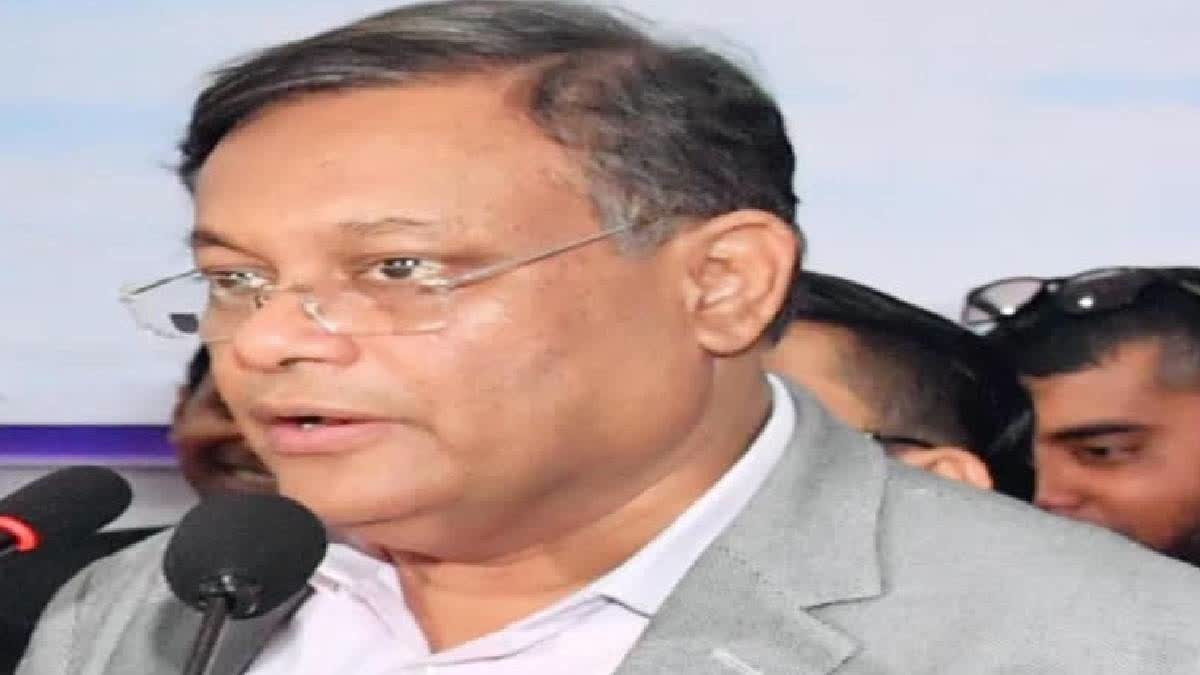New Delhi:Several factors were taken into consideration ahead of the surprising appointment of Hasan Mahmud as the foreign minister in the new cabinet of Bangladesh Prime Minister Sheikh Hasina, replacing AK Abdul Momen.
According to observers, Mahmud should make a good foreign minister given his oratory skills and his past experience as a deputy foreign minister, which Bangladesh needs for its foreign policy right now.
Mahmud, 60, completed his bachelor’s and master's in chemistry from the University of Chittagong. He completed a second master’s from Vrije Universiteit Brussel in environmental science. He earned his PhD in environmental chemistry from Transnational University Limburg in 2001.
But Mahmud entered politics much before he attained these educational degrees. He joined the Bangladesh Chhatra League, the student wing of the ruling Awami League, in 1977 when military officer Ziaur Rahman took power as President of Bangladesh. Mahmud became actively involved in the political affairs of the Awami League during the dark days of the Zia rule.
From 1996 to 2001, Mahmud served as the political and parliamentary affairs adviser to Hasina who was the Prime Minister then. In 2001, after the Awami League was defeated in the parliamentary elections, he was appointed special assistant to Hasina, who became the Leader of Oppostion in the parliament. He was also made the secretary of environment and forest affairs of Awami League.
Mahmud was appointed as the Minister of State for Foreign Affairs in 2009 after Hasina came back to power. But six months later, he was moved to the position of Minister of State for Environment and Forests. In November 2011, he was promoted to the full Minister of Environment and Forests and served in this position until the end of 2013. In the outgoing government that had come to power in 2019, he served as the Minister of Information and Broadcasting.
So, why has Mahmud been made the Minster of Foreign Affairs now?
According to Sharin Shajahan Naomi, an academic and social activist of Bangladesh who is pursuing her post-doctoral fellowship at KREA University in India, the Awami League tends to appoint a new foreign minister in every new term.
In 2009, Dipu Moni was appointed as the Minister of Foreign Affairs, followed by Mahmud Ali in 2014 and AK Abdul Momen in 2019.
Naomi told ETV Bharat that the Awami League takes into account several factors before appointing a foreign minister, the most important of which are the geopolitical changes and its own party interests. She said that Mahmud’s predecessor Momen lacked delivering in the latter factor.
“Momen’s weak point was that he could not sell the Awami League’s policy and Sheikh Hasina’s vision for Bangladesh internationally,” Naomi said. “It is important to enhance the party’s reputation in the outside world.”
Momen is a career diplomat and had served as Bangladesh’s Permanent Representative to the UN in New York before being made the Minister of Foreign Affairs. Though he was successful in building strong economic partnerships with India and China, what he lacked was in political nuances. Though he was elected in this year’s parliamentary elections, he was not given any portfolio in the new cabinet. According to Naomi, Momen assumed office as Minister of Foreign Affairs at a very critical stage when Bangladesh was facing a lot of pressure from the US and the European Union (EU). During his tenure, the US imposed sanctions against the Rapid Action Battalion (RAB), the anti-crime and anti-terrorism unit of the Bangladesh Police, and visa restrictions on Bangladesh ahead of this year’s elections. The US had been demanding free and fair elections in Bangladesh in response to which Hasina said that Washington was trying to bring about a regime change in her country.
The opposition Bangladesh Nationalist Party (BNP) had been lobbying with the US and demanding that a caretaker government be installed ahead of the elections. Hasina did not accede to this demand. Following this, a 12-party opposition alliance led by the BNP boycotted this year’s elections.
According to Shahadat Hossain, research scholar in the Department of International Relations in the South Asian University, New Delhi, Momen was under media focus for his controversial speeches and remarks.
“The way Momen shared diplomatic insider information with the country’s media embarrassed the government and the Awami League, leading to discussions about his diplomatic failures,” Hossain, who hails from Bangladesh, told ETV Bharat.
“In 2022, Momen attended a Hindu community event in Chittagong and publicly requested India to do whatever is necessary to keep Sheikh Hasina in power,” he said. “These statements were widely criticised. Even the Awami League had to clarify that his statements did not reflect the party's stance.”
Then again, Hossain pointed out, during a meeting with US Secretary of State Anthony Blinken in 2022, a sensitive period in US-Bangladesh relations, Momen said that he was always indebted to the US because “when I was homeless, jobless, and stateless, the United States gave me a home and a job”. His speech faced severe criticism both within and outside the party as unprofessional.
“Furthermore, in 2023, amid strained relations with the United States, Momen, during a meeting with US National Security Adviser Jack Sullivan in Washington said, ‘You came with advice, orders, and fear... But it cannot be contained in China. If you want to do it, bring money’. This statement was also criticised,” Hossain said.
